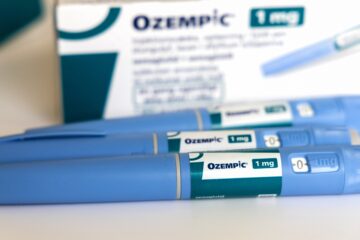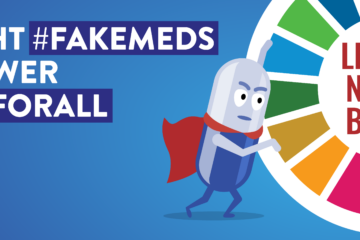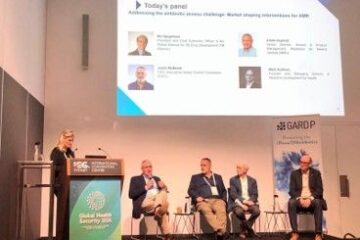Fight the Fakes together with our partner, University College London’s (UCL) Fight the Fakes chapter, just held the event ‘Digital Natives Fight Fake Medicines’ on the side lines of the 72nd World Health Assembly in Geneva – and it was a great success!
Over 150 people from all parts of the world, representing academia, industry, governments and NGOs, attended our event and tweeted about it on social media. The hashtag #FightTheFakes even became the Nr.1 trending tweet in Geneva during Monday afternoon (May 20), and the second top tweet in the whole of Switzerland!
If you missed out on our event but would like to get all the details, you can either watch the full recording on YouTube or read our summary below!
Summary of our WHA72 side event ‘Digital Natives Fight Fake Medicines’
Our Fight the Fakes event was moderated by Oksana Pyzik, senior teaching fellow at UCL School of Pharmacy and member of the Commonwealth Pharmacist Association! After welcoming all participants, she highlighted the growing issue of falsified and substandard medicines, particularly in low- and middle-income countries, and introduced the Fight the Fakes campaign.
Next up on stage was Adebayo Alonge, a pharmacist and co-founder of the tech start-up RxAll, yet at this stage he did not talk about his professional career but the very personal reason he became an advocate for fighting falsified medicines: he fell victim to fake medicines when he was just a teenager. Having suffered from severe asthma at age 17, his father bought what he thought were legitimate Salbutamol tablets from a local pharmacy. After Adebayo took these, he fell into a coma and only woke up after three weeks. The hospital he was admitted to, investigated the tablets and found that the medicine had no active content of salbutamol but instead consisted of a high dose of a sleeping pill. Adebayo’s presentation captured the audience and highlighted once more that the issue of falsified medicines is real and could happen to anybody at any time.
Having Adebayo set the scene with his personal experience of fake medicines, it was time for our first panel: ‘Harnessing the power of digital health’. Taking the stage to talk about ground-breaking technological developments in the fight against falsified medicines were Raja Sharif, CEO of Farmatrust, Israel Bimpe from Zipline, and Adebayo Alonge.
First up was Raja Sharif who delivered a brilliant presentation on how his company FarmaTrust uses blockchain technology to ensure a safer medical supply chain and subsequently consumer safety. He defines blockchain as a distributed digital ledger which logs transactions in a chronological order. Blockchain not only ensures that digital records are incorruptible, but it also allows to eliminate middlemen and central authorities. His company FarmaTrust tracks medical products from their point of manufacture to their point of final sale. At the end of his presentation, he emphasized that there is a need to shift away from discussions on how we are going to prevent falsified medicines and instead discuss which system we are going to implement in order to safeguard the supply chain.
In his second presentation of the day, Adebayo Alonge presented the digital health technology he developed to detect counterfeit medicines: a hand-held nanoscanner. The nanoscanner is connected to a mobile phone application which allows users to verify the quality and authenticity of medicines in the field. This in turn allows drug regulators to receive real-time surveillance data about the level of medicines’ quality in the country’s supply chain. Adebayo’s company, the tech start-up RxAll, already distributed around 70 nanoscanners to the food and drug administration agencies of five countries in Africa, as well as 200 pharmacies across Nigeria and Kenya.
Our third panellist, Israel Bimpe from Zipline, a company that delivers medical products in Rwanda and Ghana via drones, was not present in person but in real digital technology style he joined our panel via Skype and gave the audience a live tour of one of their distribution centres in Rwanda. Israel highlighted that the new-found drone technology will increase access to safer medicines, especially in rural and remote areas where communities may struggle with accessing high-quality drugs. In Rwanda, Zipline is able to undertake up to 150 deliveries of medical products per day and they aim towards extending their operations to all 470 health facilities in the country.
After a brief Q&A from the audience, Pernette Bourdillon Esteve, Medicines quality team at the World Health Organisation (WHO), presented the WHO’s strategy on substandard and falsified (SF) medicines. She highlighted the 2017 landmark report which was the first-ever report of the WHO addressing solely the issue of SF medicines and explained the WHO global monitoring and surveillance system. The system was set up in 2013 and its aim is to work together with Member States in improving the quantity, quality and analysis of accurate data concerning SF medical products, and to then use that data in order to improve the prevention, detection and response to those products.
After Pernette’s insightful presentation, Dr Zuberu Muvungi from the Ministry of Health in Rwanda took the stage to highlight the need to combat falsified medicines across Africa. In Rwanda, a reliable and sustainable solution is digital health, and the country’s youth has been thriving in developing technological solutions to improve the country’s public health. He particularly emphasized the need to have better border controls as weak borders would often allow for the circulation of falsified and poor-quality medicines between countries.
After listening to the detailed in-country experience and know-how from Dr Muvungi, Oksana greeted the participants of the second panel: ‘A multi-stakeholder perspective on SF medicines’ on stage. Joining Dr Muvungi, Catherine Duggan, CEO of the International Pharmaceutical Federation (FIP), Prof Serge Rudaz, University of Geneva, Cyntia Genolet, Head of Health Systems & Africa Policy at the International Federation of Pharmaceutical Manufacturers & Associations (IFPMA), and Ed Kelley, Director of the Patient Safety Programme at the WHO, sat on our second panel.
During the panel discussion, Catherine Duggan stressed the important role of pharmacists in the fight against falsified medicines. FIP is currently tackling the issue of SF medicines from various angles. They develop policies and tools to help countries and pharmacist deal with falsified and poor-quality medicines in practice. FIP further supports the next generation of pharmacists by developing comprehensive curricula in pharmacy schools across Africa which also include the topic of SF medicines.
Working for the University of Geneva, Prof Serge Rudaz elaborated upon the role of academia in tackling falsified medicines. He emphasized that one of the key undertakings of academics is the collection of reliable data – he however also highlighted that this is often a challenge in the field of SF medicines. Furthermore, designing new technologies which are cost effective, yet easily to be operated in-country, should be at the forefront of academics’ work. In order to raise more awareness of the issue of fake medicines, particularly among students from developed countries where falsified medicines are not as prevalent as in LMICs, he stressed the importance of having regular exchange programmes for pharmacy students so they get to know the reality and challenges in developing countries.
Cynthia Genolet provided a brief snapshot of IFPMA’s work in the area of falsified medicines. IFPMA has adopted a multi-approach as there is not one single solution to tackle the issue. Among the essential strategies to combat the spread of fake medicines are the improvement of countries’ national regulatory systems, collaboration with key stakeholders, holding criminals accountable for the production and circulation of fake meds, advocacy efforts for stricter national laws and crime convention, and sharing of data in order to easier identify solutions and aid decision making processes in the fight against falsified medicines.
Being asked why falsified medicines have not really gained any visibility in the discussion around patient safety and universal health coverage (UHC), Ed Kelley argued that discussions surrounding UHC are often very aspirational, yet they are not fully thought through terms of how it will actually be achieved. He argued that there is an urgent need for a shift from the current political momentum to concrete country-based evidence and tools. He further argued that in order to tackle the spread of falsified medicines, the WHO needs to increasingly engage with patients to better understand their medication behaviour.
At very last two young & future pharmacists took the stage: Maryam Jetha, student lead of Fight the Fakes chapter at UCL, and Jelena Durbek, member of the International Pharmaceutical Students’ Federation (IPSF). Both highlighted the critical role of young people in moving the global health agenda, particularly by fostering innovation and creative digital health solutions among them. Maryam also called for a global conversation in how the voice of youth can be better integrated in discussions around UHC and falsified medicines.


